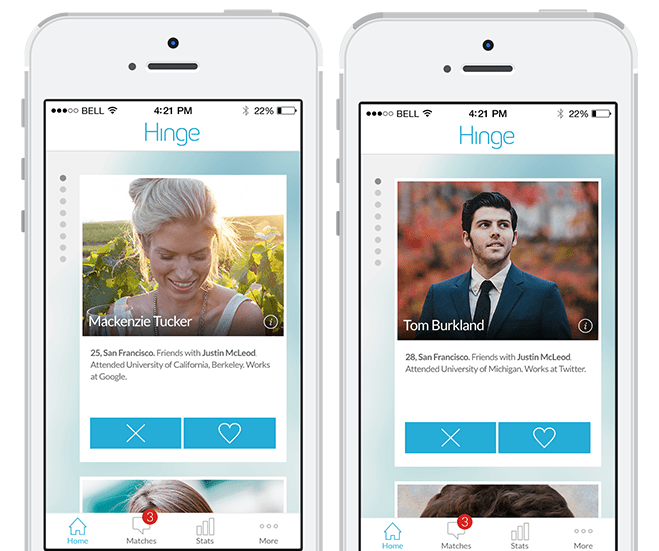 Why would prestigious VCs Founders Fund and Lowercase Capital invest $4.5 million in what looks like a Tinder clone? Because Hinge
is building a romance graph of what structured data clues suggest two
people will want to date. While Hinge’s app might not be as carefree as
swiping through Tinder’s seemingly endless queue of mates, it delivers a
daily set of tailored matches based on your profession, education
history, and interests, as well who you’ve had the hots for in the past.
Why would prestigious VCs Founders Fund and Lowercase Capital invest $4.5 million in what looks like a Tinder clone? Because Hinge
is building a romance graph of what structured data clues suggest two
people will want to date. While Hinge’s app might not be as carefree as
swiping through Tinder’s seemingly endless queue of mates, it delivers a
daily set of tailored matches based on your profession, education
history, and interests, as well who you’ve had the hots for in the past.This “matchmaker, matchmaker, make me a match” model is gaining traction, with Hinge’s iOS and Android userbase up 300% this year in the nine cities it operates in: DC, Philadelphia, NYC, Boston, San Francisco, Chicago, Atlanta, Dallas, and L.A.
What’s special about the dating app is that it’s not just pairing friends-of-friends (and friends-of-friends-of friends) with the same job or who went to the same college. Its data set which I’ve dubbed the romance graph looks for less obvious connections, like that Ivy League college alums like to intermingle, or that guys in finance like to date female lawyers.
Beyond data pulled from Facebook, Hinge users can add some extra tags about their religion, ethnicity, favorite date spots, and personality. You don’t have to fill out awkward eHarmony style essays, but Hinge can use these fields to both send you compatible matches, but also track what you’re into. You don’t have to come out and say “I only like girls of this ethnicity” or “I only like guys of this religion”, but Hinge can quietly sway your matches that way.
For a quick look at how the app works, check out the video demo and interview with founder Justin McLeod below from when Hinge launched in SF in January.
Essentially, Hinge looks a lot like Tinder. You get full-screen profiles you can swipe left or right. But you have a friend in common with everyone you’re shown. Rather than just their first name, mutual friends, and interests, you also get a last initial, employer, education history, and a few more details. And instead of an infinite stream of somewhat random profiles, you get a set of around 30 tailored matches and have to wait until the next day if you want more.
The new $4.5 million round from Founders Fund and Lowercase Capital brings it to $8.6 million in total funding, and includes participation from CAA Ventures and Lumia Capital plus previous investors Middleland Capital and Great Oaks. McLeod tells me the money will go to “focusing on product features that foster meaningful, and on-going interactions between users. This of course involves expanding our engineering team in NYC.”
Hinge is free for now but you could imagine it monetizing the way many dating apps do with subscriptions to premium features like being promoted to potential mates, getting more matches per day, or the option to message people you otherwise couldn’t.
Alternatively, it could build out its romance graph and license the data to other dating companies. People around the world are sick of the bar pickup scene, and referrals from friends can only go so far. They need a way to connect with nearby singles. Tinder has proven out a lighter weight dating app model, but there’s plenty of room for different angles like data-driven matchmaking.
The micro-Tinders for specific niches are coming. I mean, I just saw an ad for JSwipe, a Tinder clone ripoff of Jewish dating site JDate.